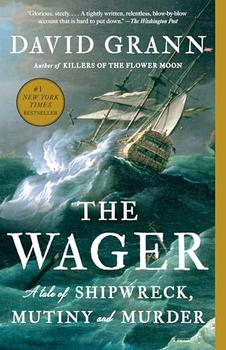Summary | Excerpt | Reading Guide | Reviews | Beyond the Book | Readalikes | Genres & Themes | Author Bio

A Tale of Shipwreck, Mutiny and Murder
by David GrannChapter 1
The First Lieutenant
Each man in the squadron carried, along with a sea chest, his own burdensome story. Perhaps it was of a scorned love, or a secret prison conviction, or a pregnant wife left on shore weeping. Perhaps it was a hunger for fame and fortune, or a dread of death. David Cheap, the first lieutenant of the Centurion, the squadron's flagship, was no different. A burly Scotsman in his early forties with a protracted nose and intense eyes, he was in flight—from squabbles with his brother over their inheritance, from creditors chasing him, from debts that made it impossible for him to find a suitable bride. Onshore, Cheap seemed doomed, unable to navigate past life's unexpected shoals. Yet as he perched on the quarterdeck of a British man-of-war, cruising the vast oceans with a cocked hat and spyglass, he brimmed with confidence—even, some would say, a touch of haughtiness. The wooden world of a ship—a world bound by the Navy's rigid regulations and the laws of the sea and, most of all, by the hardened fellowship of men—had provided him a refuge. Suddenly he felt a crystalline order, a clarity of purpose. And Cheap's newest posting, despite the innumerable risks that it carried, from plagues and drowning to enemy cannon fire, offered what he longed for: a chance to finally claim a wealthy prize and rise to captain his own ship, becoming a lord of the sea.
The problem was that he could not get away from the damned land. He was trapped—cursed, really—at the dockyard in Portsmouth, along the English Channel, struggling with feverish futility to get the Centurion fitted out and ready to sail. Its massive wooden hull, 144 feet long and 40 feet wide, was moored at a slip. Carpenters, caulkers, riggers, and joiners combed over its decks like rats (which were also plentiful). A cacophony of hammers and saws. The cobblestone streets past the shipyard were congested with rattling wheelbarrows and horse-drawn wagons, with porters, peddlers, pickpockets, sailors, and prostitutes. Periodically, a boatswain blew a chilling whistle, and crewmen stumbled from ale shops, parting from old or new sweethearts, hurrying to their departing ships in order to avoid their officers' lashes.
It was January 1740, and the British Empire was racing to mobilize for war against its imperial rival Spain. And in a move that had suddenly raised Cheap's prospects, the captain under whom he served on the Centurion, George Anson, had been plucked by the Admiralty to be a commodore and lead the squadron of five warships against the Spanish. The promotion was unexpected. As the son of an obscure country squire, Anson did not wield the level of patronage, the grease—or "interest," as it was more politely called—that propelled many officers up the pole, along with their men. Anson, then forty-two, had joined the Navy at the age of fourteen, and served for nearly three decades without leading a major military campaign or snaring a lucrative prize.
Tall, with a long face and a high forehead, he had a remoteness about him. His blue eyes were inscrutable, and outside the company of a few trusted friends he rarely opened his mouth. One statesman, after meeting with him, noted, "Anson, as usual, said little." Anson corresponded even more sparingly, as if he doubted the ability of words to convey what he saw or felt. "He loved reading little, and writing, or dictating his own letters less, and that seeming negligence ... drew upon him the ill will of many," a relative wrote. A diplomat later quipped that Anson was so unknowing about the world that he'd been "round it, but never in it."
Nevertheless, the Admiralty had recognized in Anson what Cheap had also seen in him in the two years since he'd joined the Centurion's crew: a formidable seaman. Anson had a mastery of the wooden world and, equally important, a mastery of himself—he remained cool and steady under duress. His relative noted, "He had high notions of sincerity and honor and practiced them without deviation." In addition to Cheap, he had attracted a coterie of talented junior officers and protégés, all vying for his favor. One later informed Anson that he was more obliged to him than to his own father and would do anything to "act up to the good opinion you are pleased to have of me." If Anson succeeded in his new role as commodore of the squadron, he would be in a position to anoint any captain he wanted. And Cheap, who'd initially served as Anson's second lieutenant, was now his right-hand man.
Excerpted from The Wager by David Grann. Copyright © 2023 by David Grann. All rights reserved. No part of this excerpt may be reproduced or reprinted without permission in writing from the publisher.
He who opens a door, closes a prison
Click Here to find out who said this, as well as discovering other famous literary quotes!
Your guide toexceptional books
BookBrowse seeks out and recommends the best in contemporary fiction and nonfiction—books that not only engage and entertain but also deepen our understanding of ourselves and the world around us.